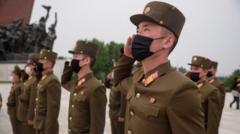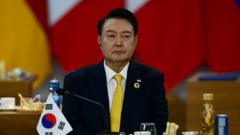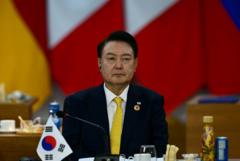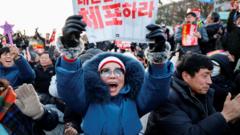The resignation of South Korea's Defense Minister Kim Yong-hyun signals the turmoil in President Yoon Suk Yeol's administration following the controversial announcement of martial law earlier this week. Kim took responsibility for the decision that led to widespread backlash, prompting an immediate reversal from the president after public protests and a unanimous rejection from the National Assembly. Opposition lawmakers have subsequently introduced impeachment motions against President Yoon, escalating the political crisis in the nation.
South Korea’s Defense Minister Resigns Amid Martial Law Controversy

South Korea’s Defense Minister Resigns Amid Martial Law Controversy
In the wake of a disputed martial law declaration, South Korean President Yoon Suk Yeol accepts the resignation of Defense Minister Kim Yong-hyun, marking a significant political shift.
As South Korea grapples with the aftermath of an unprecedented military rule announcement, President Yoon's cabinet faces mounting pressure. On Thursday, Kim Yong-hyun, the country's Defense Minister, resigned, acknowledging his part in the chaos that ensued from the martial law decree. The decision to withdraw the decree came swiftly, following protests against it and a legislative vote that firmly opposed such measures, shining a light on the strong discontent among the citizenry and political leaders alike. In response to Kim’s resignation, the president appointed Choi Byung Hyuk, a retired army general and current ambassador to Saudi Arabia, as his successor.
The repercussions of this incident extend beyond the immediate administrative changes. With the political opposition now rallying for impeachment proceedings against President Yoon, the stability of his leadership hangs in the balance, raising questions about the government's future and the citizens' trust in the ruling party. As this situation continues to evolve, analysts are closely monitoring the potential implications for South Korea's democracy and governance.
The repercussions of this incident extend beyond the immediate administrative changes. With the political opposition now rallying for impeachment proceedings against President Yoon, the stability of his leadership hangs in the balance, raising questions about the government's future and the citizens' trust in the ruling party. As this situation continues to evolve, analysts are closely monitoring the potential implications for South Korea's democracy and governance.






















